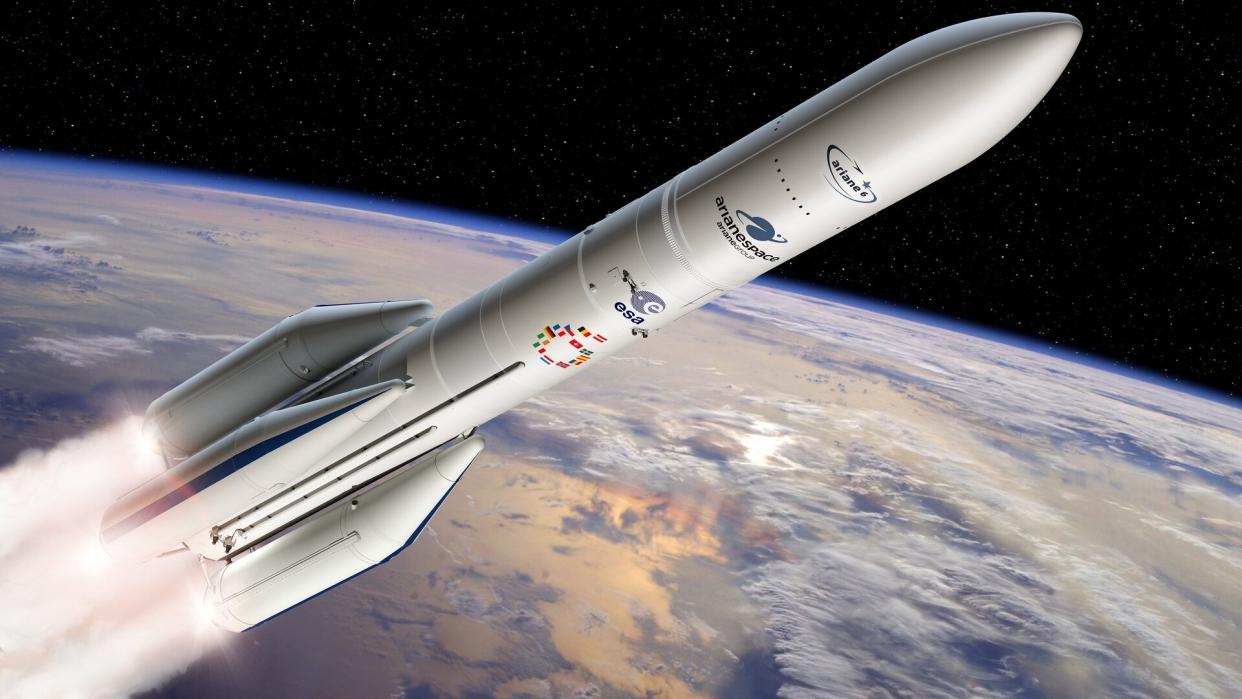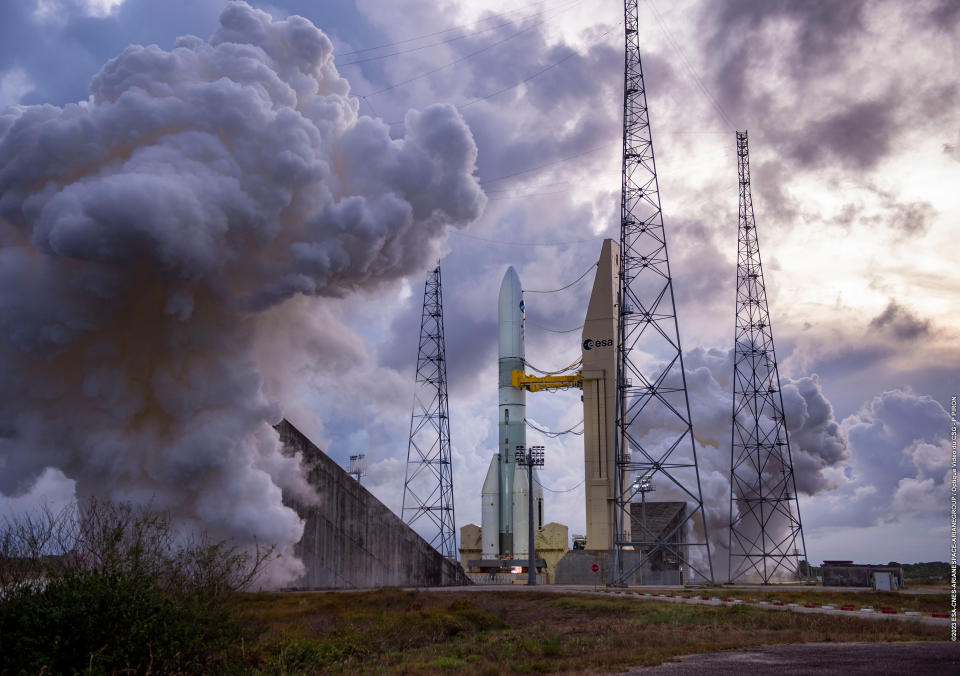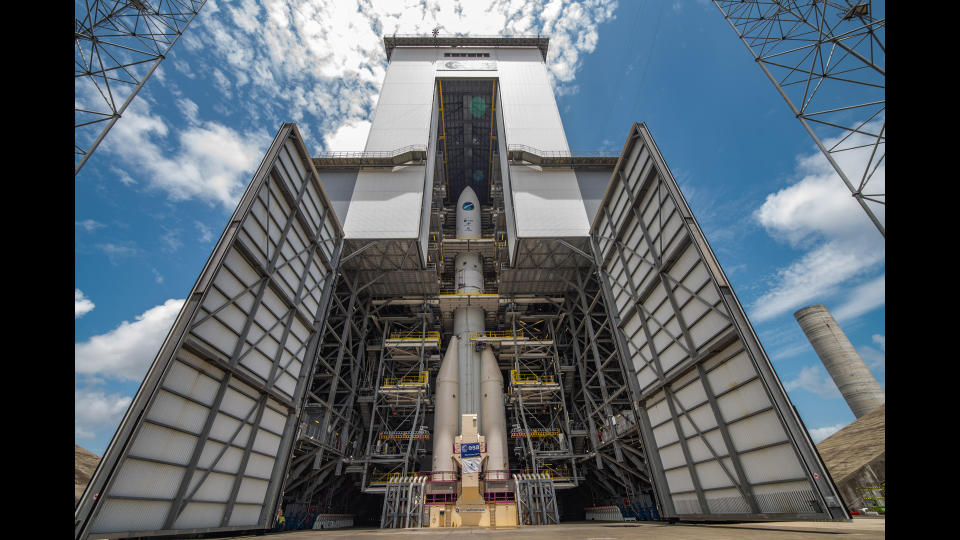1st launch of Europe's Ariane 6 rocket finally has June 2024 launch target

Europe's new heavy-lift rocket has a firm launch date at last.
The European Space Agency (ESA) Ariane 6 rocket from Arianespace will bring its debut mission to space no earlier than June 15, 2024, officials with the testing team announced Thursday (Nov. 30). On board will be a set of small satellites, including two from NASA, representatives added at the livestreamed briefing.
After four years of delays for Ariane 6, progress is accelerating: a scale model of the heavy-lift rocket also finished a critical hotfire on the pad last week in Kourou, French Guiana — which ESA director Josef Aschbacher said was a big milestone.
"Assuming everything goes nominal without any major hiccup, we expect that Ariane 6 will have its inaugural flight between the 15th of June and the 31st of July next year," Aschbacher said of the Nov. 23 hot-fire test. He cautioned later in the briefing, however, that "it is rocket science that is at stake, and therefore it is to be expected that there may be one or the other delay that can occur."
Related: Europe's new Ariane 6 rocket aces crucial 7-minute engine burn
Ariane 5 launched European spacecraft for more than 25 years, sending more than 100 missions aloft between 1996 and 2003. Prominent missions included the James Webb Space Telescope, the Jupiter Icy Moons Explorer (JUICE) and the Rosetta comet spacecraft, not to mention a dozen or so Galileo navigation satellites that give Europe its own GPS access.
Europe has emphasized that it requires independent launching access to space, but lately it has been reliant — like much of the industry — on SpaceX, which launched the Euclid dark matter-hunting mission July 1 (for example) after Ariane 6's debut launch continued to slip.
Ariane 6 was conceived in the early 2010s to meet a new generation of launching needs — lowering costs and launching more satellites to different orbits at once, for example — after the aging Ariane 5 design retired this July. But numerous technical obstacles and the COVID-19 pandemic got in the way of Ariane 6's planned gate-opening mission in 2020.
"We were literally in crisis," Aschbacher said of the gap, and said the problem was compounded by poor communication about milestones and delays. Today, however, regular and detailed reports are now available to ESA member states, the public and journalists after Ariane 6 task force meetings.
"We have learned our lessons," Aschbacher said, acknowledging the help of Arianespace, Ariane Group and the French national space agency (CNES) in addressing issues as they arose. "We have been sitting together, and we have taken very clear action to overcome the crisis, as we call it. It literally was a crisis. We had to get out. And let me say that we have done this together. This is not ESA alone."
Related: When will Ariane 6 fly? Europe's new heavy-lift rocket battles delays as Ariane 5 era ends

Lessons learned include bringing more options for European launching. Aschbacher pointed to a new ESA member state agreement announced at the European Space Summit in Seville, Spain on Nov. 6 that will continue to improve access against SpaceX. He framed it as a "paradigm shift" that will bring more opportunities for European companies, once more details are available.
The agreement includes short-term financing by ESA members for both Ariane 6 and the new lighter-launch Vega-C that has flown twice so far, both times in 2022. ESA also committed to bringing more launches to private companies to diversify options and drive down cost — ahead of bringing in reusable rockets in the 2030s or so.
Philippe Baptiste, president of CNES, praised the deal, saying it will prepare Europe "for a future in which we will have more competition, but also [with] more freedom for the industry and more responsibility for the same industry. This is a step forward."
Related: Europe won't have reusable rockets for another decade: report

For now, however, the spotlight is on Ariane 6 to perform well on its first flight. Happily, the hot fire test on Nov. 23 "worked perfectly well", with the data gathered from the effort showing "the results are what we are expecting," Martin Sion, CEO of ArianeGroup, said in the same briefing.
The test cut off 44 seconds shorter than its expected 470-second (nearly eight-minute) milestone, however. Officials said it was because a sensor that measures how much fuel is left in the tanks was using a "conservative" setting for the testing conditions, and that the glitch should not affect the flight.
The team is now getting ready for two more big Ariane 6 tests in the first part of December. A hot fire of the upper stage will happen at the German Aerospace Center's Lampoldshausen site on Dec. 7, to see how the stage will perform if a launch is running in "degraded conditions." A week later, on Dec. 15, a test of fuel loading will take place in Kourou for slightly off-nominal conditions as well, including a short ignition of the core stage engine.
In fact, all forthcoming key tests of Ariane 6 will evaluate the launcher of "non-nominal situations", Aschbacher added. Knowing that, and also having solid data from the hotfire test, gave ESA and the task force even more confidence in announcing the mid-June launch date. Arianespace, meanwhile, is building out its launch manifest for future flights with potential customers.
But not all is guaranteed; if something unexpected arises, the delay may stretch even further as "there is still a lot of work to be done," CNES' Baptiste said in French (translation provided by Space.com), outlining measures such as the tests and the assembly at Ariane Group's factories that must be done before the big day.
Arianespace's Sion added in French that even more confidence will come when Ariane 6 passes its launch system qualification review next year, to establish that the rocket is safe for launch.
Related Stories:
— Farewell, Ariane 5! Europe's workhorse rocket launches 2 satellites on final mission (video)
— Watch Europe's new Ariane 6 rocket fire its engines in new timelapse video
— When will Ariane 6 fly? Europe's new heavy-lift rocket battles delays as Ariane 5 era ends
"It is fundamental for the reliability of the rocket. We know that was the hallmark of Ariane 5, and this reliability is necessary for Ariane 6 — and what we owe to our customers," Sion said. "We will not make shortcuts. A qualification review can find problems that have been forgotten. It is better to find them there, than during the first launch.
"It would be presumptuous for us to say," Sion continued, pointing to the Ariane 6 launch campaign in general, "that we have put all problems behind us. (But) we have enough behind us to consider that we can announce a date. That's the big change today."
But if all goes to plan, added Arianespace CEO Stéphane Israël in the same briefing, the first commercial flight will be by the end of 2024 with "as many flights as possible in 2025." Eventually, he added, Ariane 6 may be launching as many as 9 to 10 missions a year.

